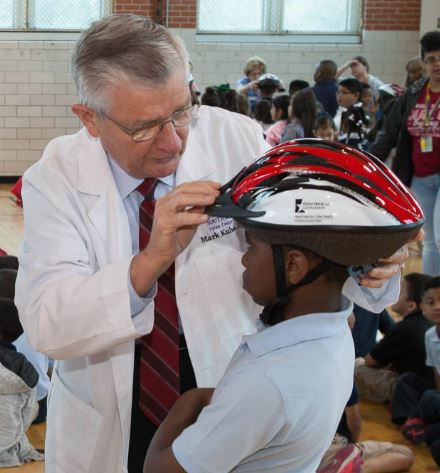Nov. 28, 2017
If you’re surprising a
child with a shiny new bicycle this holiday season, remember to give a helmet,
too. The physicians of the Texas Medical Association (TMA) say that accessory
could save your child’s life.
Doctors believe bikes —
and helmets — make great gifts, because they encourage exercise. “We doctors want
kids to be active every day and to be safe while doing so,” said Mark Kubala,
MD, a Beaumont neurosurgeon and member of the TMA Hard Hats for
Little Heads
Physician Advisory Panel. Dr. Kubala actively participates in helmet giveaways
in his community with the Jefferson County Medical Society and Alliance to help
children enjoy safe cycling.

Wearing
a properly-fitted helmet appropriate for the sport is key to preventing a
serious head injury whether biking, inline or roller skating, skateboarding, or
riding a scooter. An accident can happen in an instant, and it can change a
life forever.
Dr.
Kubala said he has seen many advancements in the treatment of head injuries
during his long career, but medical treatments cannot fix everything. When a
head injury occurs, depending how severe, the brain may be injured permanently.
Once cells of the brain are injured, doctors can support the brain and hope the
cells can recover or that other brain cells will make up for the injured cells.
“Without
a doubt, the best treatment for a head injury is prevention,” Dr. Kubala said.
A properly fitted helmet can prevent serious
head injuries up to 85 percent of the time; and can help protect a cyclist from
injuries to the face, forehead, and neck. But helmets aren’t just important
when riding a bike. They can also prevent head injuries in other activities,
such as skiing and horseback riding, Dr. Kubala said.
This new TMA video shows how a bike helmet
should fit for best protection. TMA recommends the 2-V-1 rule:
- The
helmet should fit level on the child’s forehead, allowing no more than two
fingers’ worth of space between the helmet and the eyebrows;
- The
straps should form a snug “V” around the ears; and
- No
more than one finger should fit between the strap and the chin.
“When
parents and children are educated about the importance of wearing a helmet, I believe
they’ll make the right choice,” said Dr. Kubala. “My hope is that we never see
a person riding a bicycle without a helmet,” as the neurosurgeon
prefers to prevent injury rather than have someone suffer and endure difficult
treatment — or a worse fate.
TMA promotes
fun exercise and teaches parents and children about the importance of wearing a
properly fitted helmet through its Hard Hats for Little Heads bike helmet giveaway program. Since
1994, TMA has given 280,000 helmets to Texas children.
TMA is the
largest state medical society in the nation, representing more than 50,000
physician and medical student members. It is located in Austin and has 110
component county medical societies around the state. TMA’s key objective since
1853 is to improve the health of all Texans.
Hard Hats for Little Heads is made
possible in 2017 through a grant from TMA’s philanthropic arm, the TMA Foundation
(TMAF), thanks to top donors — Blue Cross and Blue Shield of Texas, an
anonymous physician and spouse, TMAF Make-A-Difference donors, and the Baptist Health
Foundation of San Antonio — and generous gifts from TMA and TMA
Alliance members, and friends of medicine.
– 30 –
Contact: Brent
Annear (512) 370-1381; cell: (512) 656-7320; email: brent.annear[at]texmed[dot]org
Marcus
Cooper (512) 370-1382; cell: (512) 650-5336; email: marcus.cooper[at]texmed[dot]org
Connect
with TMA on Twitter, Facebook, and Instagram.
Check
out MeAndMyDoctor.com for
interesting and timely news on health care issues and policy.